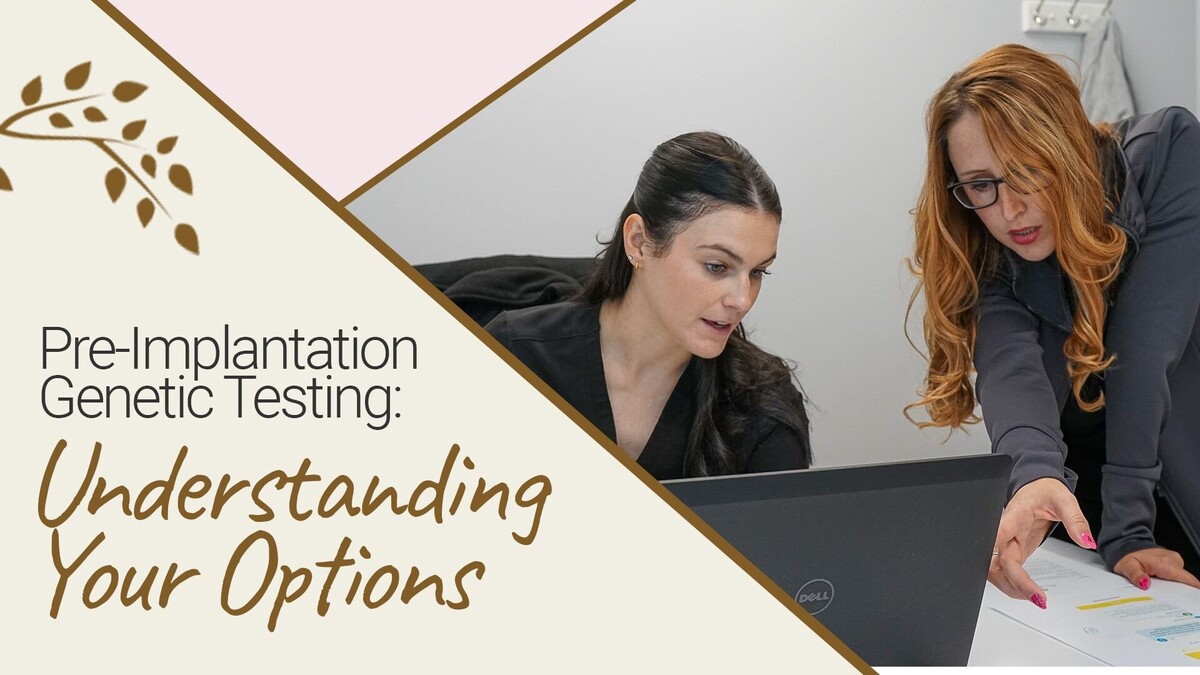Pre-implantation Genetic Testing: Understand Your Options

Embarking on a fertility journey can feel overwhelming at times, especially when you're faced with big decisions about treatments and testing. One option that offers clarity and peace of mind is pre-implantation genetic testing (PGT). By screening embryos for potential genetic issues before implantation, PGT can help you take an important step toward a healthy pregnancy.
In this blog, we’ll explain how PGT works, what types of tests are available, and how it might fit into your fertility plan—all in a way that’s easy to understand, even if you’re just starting to explore your options.
What is Pre-implantation Genetic Testing and How Does It Work?
At its core, pre-implantation genetic testing (PGT) is a way to gather more information about embryos before they’re implanted in the uterus. Think of it like giving each embryo a "health check-up" to see if there are any genetic conditions or chromosomal abnormalities that might affect its development.
PGT is done during in vitro fertilization (IVF), usually when embryos are 5 or 6 days old (also known as the blastocyst stage). A tiny sample of cells is taken from each embryo, and those cells are tested in a lab. The goal? To choose the healthiest embryos to improve the chances of a successful pregnancy.
Types of Tests
There are a few different types of PGT testing, and each one looks for specific genetic concerns. Here’s a simple breakdown:
- PGT-A (Pre-implantation Genetic Testing for Aneuploidies): This test checks for the correct number of chromosomes. It helps spot issues like Down syndrome, which occurs when there’s an extra chromosome.
- PGT-SR (Pre-implantation Genetic Testing for Structural Rearrangements): This test looks for problems with the structure of chromosomes, like if pieces are in the wrong order. It’s helpful for people who carry genetic rearrangements that can lead to miscarriages.
- PGT-M (Pre-implantation Genetic Testing for Monogenic Disorders): This one focuses on specific genetic disorders passed down through families, such as cystic fibrosis or Huntington’s disease. If you or your partner have a family history of these conditions, PGT-M can ensure that embryos without the disorder are selected.
Process
The process of PGT is like giving your embryos a detailed report card. After the embryos are created through IVF, a small biopsy (or cell sample) is taken from each one. These cells are sent to a lab where they’re carefully analyzed.
The results, which usually come back within about 7 to 10 days, will help determine which embryos are healthiest. Once the testing is complete, you and Dr. Chin can choose the best embryo to transfer. This increases your chances of a healthy pregnancy while reducing the risk of passing on genetic conditions.
Benefits and Risks of Pre-implantation Genetic Testing
Every fertility treatment comes with its own set of considerations. Pre-implantation genetic testing offers many benefits, but it’s important to understand both the advantages and potential risks so you can make the best decision for your journey.
Benefits
The biggest advantage of PGT is peace of mind. By knowing which embryos are healthiest, you’re able to make more informed choices about which ones to transfer, giving you a higher chance of success. For example, PGT-A can reveal which embryos have the correct number of chromosomes, while PGT-M ensures embryos are free from genetic disorders that run in your family.
For many, PGT can also reduce the likelihood of miscarriage and increase the chances of a successful pregnancy.
Risks
While PGT testing is generally safe, no procedure is completely risk-free. The main concern is that taking a small biopsy from the embryo could cause some damage, though this is rare. There’s also a small chance that the results may be inconclusive or incorrect, though, again, this is rare.
Dr. Chin carefully evaluates these risks and recommends PGT when the benefits outweigh any potential drawbacks, ensuring that every decision is made with your unique situation in mind.
Who are Good Candidates for Pre-implantation Genetic Testing?
You might be wondering, “Is PGT right for me?” While it’s not necessary for everyone, PGT testing can be especially helpful for certain people and situations. Here’s who might benefit the most:
- People with a family history of genetic disorders, such as cystic fibrosis, Huntington’s disease, or sickle cell anemia.
- Couples who have experienced multiple miscarriages or have had failed IVF cycles due to chromosomal abnormalities.
- Individuals who are older or have a low ovarian reserve and want to improve their chances of a successful pregnancy.
If any of these situations sound familiar, pre-pregnancy genetic testing might be worth considering.
How PGT Can Empower Your Fertility Journey
When you’re going through fertility treatments, it’s natural to feel a mix of hope, worry, and sometimes even confusion. Pre-implantation genetic testing can help reduce some of that uncertainty by giving you more control over the process.
PGT can’t guarantee a successful pregnancy, but it can provide crucial information that helps you make more informed decisions. For many, it offers a sense of empowerment—allowing you to take one step closer to the family you’ve been dreaming of.
Next Steps: Consult with The Fertility Wellness Institute of Ohio
If you’re considering pre-pregnancy genetic testing, the team at The Fertility Wellness Institute of Ohio is here to support you. Dr. Chin and his team are dedicated to providing personalized care that meets your unique needs, helping you determine whether PGT is the right option for your fertility journey.
To learn more about PGT testing or to schedule a consultation, schedule an appointment today!
Follow the Fertility Wellness Institute of Ohio on Facebook, Instagram, X, and LinkedIn!
Do you want to share your fertility journey with the Fertility Wellness Institute of Ohio? Share your story here!

